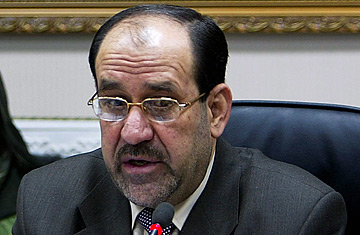
Iraqi Prime Minister Nouri al-Maliki speaks during a meeting with the heads of foreign diplomatic missions in Iraq at the fortified Green Zone area in Baghdad, Iraq, Wednesday, January 17, 2007.
American paratroopers are already pouring into the Iraqi capital as part of President Bush's troop surge. Maliki said those troops could soon leave if the U.S. provided the Iraqi security forces with more weapons and equipment. "If we succeed in implementing the agreement between us to speed up the equipping and providing weapons to our military forces," he said, "I think that within three to six months our need for the American troops will dramatically go down."
Maliki is sad-eyed and serious, and his light beard and thinning hair don't contribute to an air of vigor. Late last year he said he wished he'd never taken the top post in Iraq's government — and that was before criticism from Washington reached a crescendo after the unruly sectarian debacle of Saddam Hussein's execution. But he seemed in good spirits and was occasionally forceful Wednesday afternoon as he sat at the head of a long conference table and fielded reporters' questions. He replied in kind to the slightly condescending commentary on him and his government coming from the White House and the State Department.
Maliki — taking a page from President Bush's political playbook — said that by wavering in its support for the Iraqi government, the Administration was emboldening terrorists. Insurgents might take such comments as a sign "that they have defeated the American Administration," Maliki said. "But I can tell you that they have not defeated the Iraqi government." Responding to Bush's comment that the Saddam execution showed that his government "has still got some maturation to do," Maliki took a moment to sympathize with his American counterpart. "I know President Bush, and I know him as a strong person that does not get affected by the media pressure," Maliki said through a translator. "But it seems that the pressure has gotten to [such] a great extent that [it] led to the President giving this statement."
When asked about Condoleezza Rice's intimation that time is running out for Maliki to save his government, the Prime Minister responded: "I don't think that we're on borrowed time. I might be able to say that the Iraqi government is better able to continue working than some other governments." But while Maliki didn't shy away from rhetorical combat with Washington, he was less forthcoming about the possibility of actual combat with Iraq's Shi'ite militias. He distanced himself from Moqtada al-Sadr and pointed to arrests and clashes with the Mahdi Army militia. (However, his claim during that the interview that 400 Mahdi Army fighters had been detained was denied by a Sadr spokesman later.) But he was careful to frame criticism of armed groups in general terms and over a wide geographical area — without singling out Sadr.
He did not, however, dismiss the possibility of large-scale military action against the militias. Instead he seemed to warn that the time for politics might be coming to an end. "When military operations start in Baghdad, all other tracks will stop," he said. "The political tracks will stop, and it will be only the military track against the militias and people who break the law." In the murky world of Iraqi politics it is impossible to know if this signals a battle to come, or is yet another move in a political chess game. Maliki is a canny politician, and he may be playing the game better than Washington suspects.
